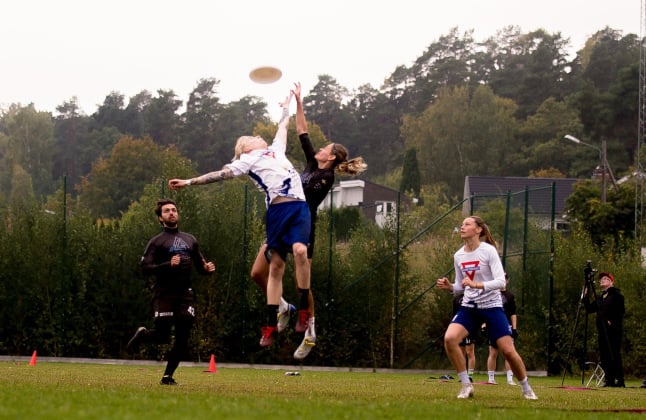Many who move to Sweden experience an initial reservedness or difficulty to make friends, with the country often named in surveys as one of the worst places to make new friends. For Erin, her ultimate frisbee league was a way to connect with other people after her move.
“I think it’s difficult moving countries anyway, but it does feel sometimes in Sweden that you have to really put yourself out there and make the first move, so joining this club meant that we met tens of people and quickly got invited to a drink after a training session,” she tells The Local.
Erin moved to Sweden with her partner two years ago looking for a change from their busy London lifestyle, being attracted by the Swedish work-life balance.
“It feels very quiet compared to London which has loads and loads of people all the time so there is a sense of peace which is good. That being said, there are less things to do potentially than the busy London life,” she says.
Having played ultimate frisbee throughout university, even representing Great Britain at a junior level, Erin looked up an ultimate frisbee league in Stockholm when she arrived.
“Coming here I always had it in the back of my mind, I hope there is a frisbee team! And there was,” she says about how she originally found her club, the Stockholm Ultimate Frisbee Club, where she plays for the women’s team Valkyria.
The team organises several training sessions per week in their youth, women’s, opens and mixed divisions.
“It’s a sport that you wouldn’t necessarily know about but once you’re in it it is a massive world of clubs and teams.”

Photo: Illia Shypunov Ultimate Photography
What is ultimate frisbee?
Ultimate frisbee is a non-contact sport that Erin describes as a mixture of American football and basketball.
Something that sets it apart from some other sports is its strong culture, which is what initially drew her to trying it out.
“It has a really good ethos to it where it is self refereed. It is quite unique actually,” Erin explained.
According to Ultimate Frisbee HQ, what is known as The Spirit of the Game is a code of conduct which runs deep in every player – treat others how you would want to be treated. There is therefore no referee needed on the pitch.
Although there are youth and women-only teams in the club, there are also mixed teams, something that is quite unusual for many sports leagues.
“I think the mixed thing is really good. Now I have my partner here as well: we can go to those practices together and train together,” Erin said.

Photo: Illia Shypunov Ultimate Photography
Getting through Covid
The Covid pandemic meant that most team activities needed to be put on hold during 2020. This was also the case for Erin’s Stockholm ultimate frisbee club who stopped indoor training.
“Official training sessions stopped, but the community was still there so a few of us went on socially distanced walks, we met up in smaller groups,” she says.
During the summer with better weather, some training was able to be taken up again outside, and the Beach National Championships still went ahead. However, a large portion of the team was made up of international students, most of whom had returned home, which has affected the team numbers greatly.
“From a woman’s perspective I think it’s really sad as well,” Erin says, noting how her team Valkyria is short on members.
With vaccinations under way in Sweden, Erin is hopeful membership numbers will begin to rise again.
“It appeals to someone who wants to be fit and healthy but also wants to play a team sport and team sports offer a lot, it’s fun to play together, you really get to know your teammates, we help each other.”



 Please whitelist us to continue reading.
Please whitelist us to continue reading.
Member comments